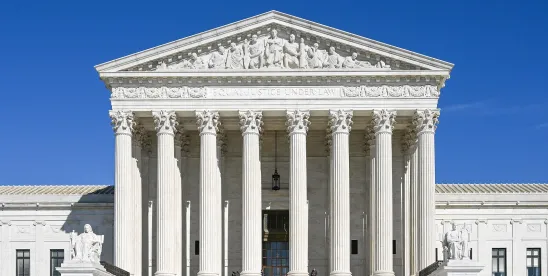The Supreme Court of the United States has agreed to hear a case that will decide whether retirees can sue for disability discrimination because of changes to retiree benefit plans.
Quick Hits
- A former firefighter sued the city of Sanford, Florida, claiming it discriminated against her when it shortened the duration of health benefits for disabled retirees.
- The U.S. Court of Appeals for the Eleventh Circuit upheld the city’s decision to scale back the retiree health benefit to conserve funds.
- The Supreme Court of the United States will hear the case during its current term, which will end in June 2025.
A firefighter for the city of Sanford, Florida, served for about fifteen years until she was diagnosed with Parkinson’s disease. She became unable to perform essential job functions and retired in 2018 at the age of forty-seven. When she joined the fire department, employees who retired for disability reasons were eligible to receive employer-paid health insurance until age sixty-five. But the city changed the plan in 2003, so that employees who retired for disability reasons (with less than twenty-five years of service) were eligible for employer-paid health insurance for only twenty-four months after their retirement date.
The firefighter sued, alleging the benefit change violated the federal Americans with Disabilities Act (ADA).
On October 11, 2023, the U.S. Court of Appeals for the Eleventh Circuit ruled in favor of the city, concluding that ADA cases must brought by “qualified individual[s],” which the statute defines as people who “can perform the essential functions” of the job with or without a reasonable accommodation. Thus, a former employee who is unable to perform essential job functions cannot be a “qualified individual” and cannot sue for purported discrimination in retiree benefits.
However, the Eleventh Circuit recognized that the federal appellate courts are split, with the Sixth, Seventh, and Ninth Circuits agreeing with the Eleventh Circuit’s position, and the Second and Third Circuits holding that former employees do not lose their right to pursue ADA claims just because they no longer are employed.
The city argued that the definition of “qualified individual” uses the present tense, and the determination of whether a person is a qualified individual must be made at the time of the employment action about which the plaintiff complains.
The city also argued that the distinction between the benefits received by employees retiring with twenty-five years of service and disabled retirees with less than twenty-five years of service demarcated neutral lines that were rationally related to the city’s legitimate goal of containing future costs.
The firefighter argued that the city’s interpretation erroneously conflates who can be discriminated against with who can sue. She claimed the city discriminated against her when it made the benefit change, but at that point, she had not sustained any injury from the benefit change and, therefore, could not file suit. After her retirement and receipt of only twenty-four months of the subsidy, she claimed she had suffered injury and had standing to file the lawsuit.
The firefighter also questioned the cost justification for the city’s benefits reduction, arguing that the city could not identify any data or calculations upon which it based its decision to rescind benefits for disabled retirees.
The U.S. Equal Employment Opportunity Commission (EEOC) has opined that the ADA does not “require that service retirement plans and disability retirement plans provide the same level of benefits because they are two separate benefits which serve different purposes.” However, the agency has commented in interpretative guidance that “benefit reductions adopted for discriminatory reasons are in violation” of the ADA.
Next Steps
Given the circuit split regarding who can pursue ADA claims, the Supreme Court agreed to hear the case. Oral arguments have not been scheduled yet.
The issue before the Supreme Court is straightforward: May former employees file suit under the ADA for purported disability discrimination in post-employment benefits?
The plain language or plain meaning rule of statutory construction usually is a winner in the Supreme Court. But eliminating post-employment benefits from ADA scrutiny may seem to be unfair and may go against the purpose of the ADA to enable people with disabilities to partake in all the privileges and benefits of employment just like individuals without disabilities.
If the Supreme Court rules that retirees may not claim discrimination in post-employment benefits, that will lay to rest any concern of employers and HR professionals that cost-cutting measures with respect to retirement benefits may be subject to ADA challenge.
If the Supreme Court rules that former employees may pursue ADA challenges to the structure of post-employment benefits, however, employers and HR professionals may want to prepare to justify the distinctions and explain why those distinctions do not discriminate on the basis of disability.
As employers look to save costs in their operations, reducing or eliminating retiree benefits may be a prime option for consideration. If reductions in post-employment benefits apply to disabled retirees to a greater extent than those without disabilities, this distinction may well spawn lawsuits, thereby eliminating the flexibility that employers previously may have had (depending upon the circuit) in making tough choices about the continued funding of retiree benefits.
The bottom line is that employers may want to prepare to justify distinctions in fringe benefits that differentiate between retirees with and without disabilities based on cost or other nondiscriminatory reasons.




 />i
/>i

